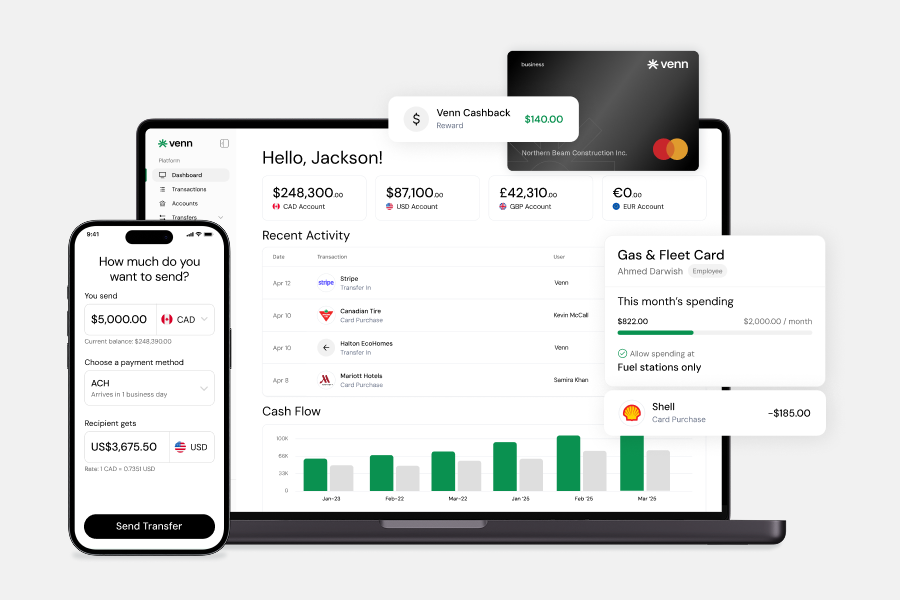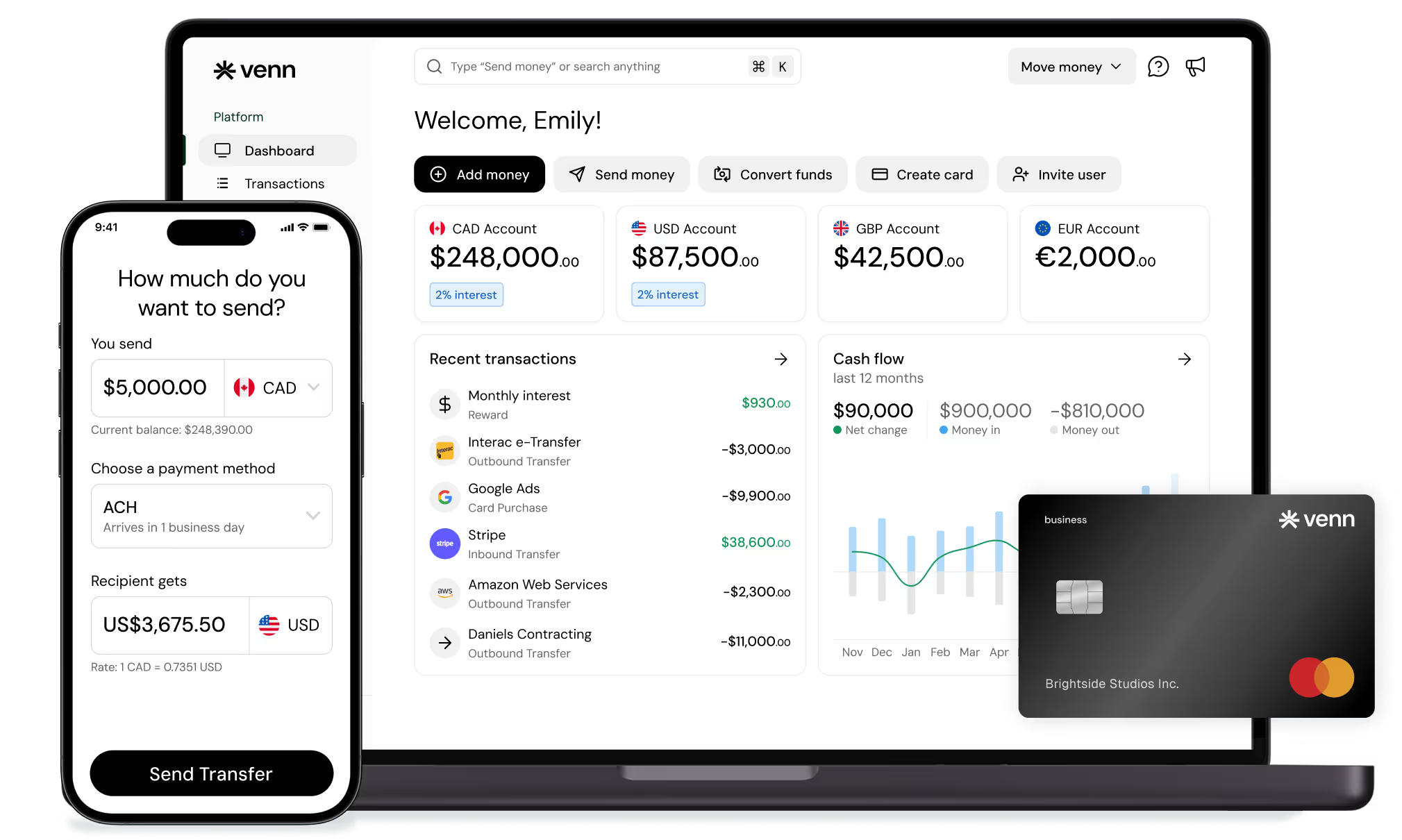LLC vs Sole Proprietorship Canada: Expert Guide for Businesses
Discover the key differences between LLC vs sole proprietorship Canada. Make informed decisions on structure, taxes, and banking for your Canadian business.


Trusted by 5,000+ Canadian businesses
Business banking for Canada
Local CAD and USD accounts, corporate cards with cashback, the lowest FX rates in Canada, free local transfers, and more.
LLC vs Sole Proprietorship in Canada: The Complete Guide to Choosing Your Business Structure
When you're starting a business in Canada, one of your first major decisions involves choosing the right legal structure. Many entrepreneurs search for information about LLCs versus sole proprietorships, but here's what you need to know: Canada doesn't actually have LLCs. Instead, Canadian businesses choose between sole proprietorships and corporations, which provide similar benefits to what American LLCs offer. This guide will help you understand these options and make the best choice for your Canadian business.
Understanding Business Structures in Canada
The Canadian business landscape offers several structure options, but the two most common choices for new entrepreneurs are sole proprietorships and corporations. While you might have heard about LLCs from American business content, the Canadian equivalent is incorporation, which creates a separate legal entity for your business. Understanding these structures and their implications will set the foundation for your business's financial future, from tax obligations to banking relationships.
Interested in learning more about Venn's incorporation product? Check out our product page now.
What is a Sole Proprietorship in Canada?
A sole proprietorship represents the simplest way to start a business in Canada. When you operate as a sole proprietor, you and your business are legally the same entity. This means you can start operating immediately, often with just a business name registration that costs between $60 and $80 depending on your province. In some cases, if you're operating under your own legal name, you might not need to register at all.
The beauty of this structure lies in its simplicity. You report business income on your personal tax return using Form T2125, and you maintain complete control over all business decisions. There's no need for corporate meetings, bylaws, or complex accounting structures. For many freelancers, consultants, and small service providers, this straightforward approach allows them to focus on building their business rather than managing administrative complexity.
Corporations: The Canadian Alternative to LLCs
Corporations in Canada function as separate legal entities from their owners, providing the liability protection and structural benefits that many associate with LLCs in the United States. You can incorporate either federally through Corporations Canada or provincially through your local registry. Federal incorporation typically costs around $200 to $300, while provincial fees vary from $300 to $500 depending on your location.
When you incorporate, you create a distinct legal person that can enter contracts, own property, and incur debts independently of you as an individual. This separation provides crucial protection for your personal assets and opens doors to tax planning strategies unavailable to sole proprietors. The corporation issues shares to its owners, maintains its own bank accounts, and files separate tax returns, creating clear boundaries between personal and business finances.
Key Differences That Impact Your Business
The choice between sole proprietorship and incorporation affects nearly every aspect of your business operations. From daily financial management to long-term growth strategies, understanding these differences helps you align your business structure with your goals and risk tolerance.
Legal Liability and Asset Protection
The most significant difference between these structures involves liability protection. As a sole proprietor, your personal assets remain exposed to business risks. If your business faces a lawsuit or cannot pay its debts, creditors can pursue your personal property, savings, and other assets. This exposure becomes particularly concerning in industries with higher liability risks, such as construction, professional services, or any business that involves significant customer interaction.
Incorporation creates a legal shield between your personal and business assets. When properly maintained, this corporate veil means that business creditors generally cannot pursue your personal assets to satisfy corporate debts. However, this protection requires careful adherence to corporate formalities. You must maintain separate bank accounts, avoid commingling personal and business funds, and ensure proper documentation of corporate decisions. Directors can still face personal liability in cases of fraud, unpaid wages, or certain tax obligations, but the overall protection remains substantial compared to sole proprietorship exposure.
Tax Implications and Strategies
Tax treatment represents another crucial distinction between these structures. Sole proprietors face immediate taxation on all business income at their personal tax rates, which can reach over 50% for high earners in some provinces. You cannot defer this taxation or take advantage of income splitting strategies, limiting your tax planning options.
Corporations enjoy access to the small business deduction, which reduces the tax rate on the first $500,000 of active business income to approximately 9% to 12.2% depending on your province. This creates powerful tax deferral opportunities, allowing you to leave profits in the corporation and pay personal tax only when you withdraw funds as salary or dividends. Additionally, corporations can implement income splitting strategies through dividend payments to family members who are shareholders, though recent tax changes have added complexity to these arrangements.
Banking and Financial Management Requirements
Your business structure directly impacts your banking relationships and financial management requirements. Sole proprietors can often use their personal bank accounts for business transactions, though maintaining separate accounts improves bookkeeping and demonstrates professionalism. Opening a sole proprietorship business account typically requires only your business registration and personal identification.
Corporate banking involves more complex requirements. You'll need articles of incorporation, corporate resolutions authorizing account opening, and potentially multiple signatures for transactions. However, modern business banking platforms like Venn have streamlined these processes significantly. With digital onboarding and integrated financial tools, corporations can now access sophisticated banking services that support multi-currency operations, automated accounting integration, and expense management, all crucial for growing businesses that need to manage increasing financial complexity.
Cost Analysis: Initial Setup and Ongoing Expenses
Understanding the true cost of each business structure helps you budget appropriately and avoid surprises as your business grows. While sole proprietorships offer lower entry costs, corporations provide value through tax savings and liability protection that often justify the higher expenses.
Sole Proprietorship Costs
Starting a sole proprietorship requires minimal financial investment. Business name registration typically costs $60 to $80 in most provinces, and you might need a municipal business license ranging from $50 to $250 annually. Many sole proprietors handle their own bookkeeping and tax filing, especially in the early stages, keeping professional fees low. As your business grows, you might invest in accounting software ($20 to $50 monthly) and eventually hire a bookkeeper or accountant for year-end tax preparation ($500 to $1,500 annually for simple operations).
Corporation Formation and Maintenance Expenses
Incorporating involves higher upfront and ongoing costs. Federal incorporation through Corporations Canada costs $200 online or $250 by mail, while provincial incorporation fees range from $300 to $500. Most entrepreneurs also pay legal fees ($500 to $1,500) for customized articles of incorporation and initial corporate setup. Annual maintenance includes corporate tax return preparation ($1,500 to $3,000 for small corporations), annual filings ($20 to $50), and potentially more complex bookkeeping requirements. Despite these costs, many businesses find that tax savings from the small business deduction more than offset the additional expenses.
Making the Right Choice for Your Canadian Business
Choosing between sole proprietorship and incorporation depends on your specific circumstances, business goals, and risk tolerance. Consider your industry's liability risks, growth plans, and tax situation when making this decision. Many successful businesses start as sole proprietorships and incorporate when growth, liability concerns, or tax planning opportunities justify the transition.
The good news is that modern financial infrastructure supports both structures effectively. Whether you choose the simplicity of sole proprietorship or the protection of incorporation, having the right banking partner ensures smooth financial operations. For entrepreneurs ready to take the next step in their business journey, our comprehensive guide on starting a small business in Canada provides detailed information on business registration, licensing, and other essential startup requirements.
If you're leaning toward incorporation, you'll want to understand the specific steps and requirements involved. Our detailed resource on how to incorporate a business in Canada walks you through the entire process, from choosing a business name to filing articles of incorporation, making the journey more manageable for first-time entrepreneurs.
Your business structure forms the foundation of your entrepreneurial journey, but it's just the beginning. Focus on building a strong business with proper financial management, and remember that you can always adjust your structure as your needs evolve. The key is starting with a clear understanding of your options and choosing the path that best supports your vision for success.
Frequently Asked Questions:
Q: What is Venn?
Venn is the cheapest and easiest way for Canadian businesses to manage their banking needs. We offer chequing accounts in multiple currencies, the best currency exchange rates in Canada, a corporate Mastercard for all spend, and free domestic and international bank transfers.
Q: What currencies does Venn support?
Venn supports receiving and holding funds in 4 primary currencies (CAD, USD, GBP, and EUR). For sending money out, you can process payments in 36 different currencies, giving your business comprehensive international reach.
Q: Does Venn have hidden fees or minimum balance requirements?
No, Venn is built on transparent pricing. We have no hidden fees, and all charges (FX, premium plans) are clear. Additionally, we require no minimum deposit balance to open or maintain an account, making it accessible for all businesses.
Q: Do my funds earn interest with Venn?
Yes, unlike many traditional business accounts, your CAD and USD funds held with Venn will earn 2% interest annually, regardless of your account balance. This ensures your working capital is always earning money for your business.
Q: Does Venn offer customer support?
Yes. Our dedicated Support specialists are available 24 hours a day, 7 days a week, 365 days a year via Chat or Email. All support tickets are monitored and responded to within 24 hours, with an average response time of 30 minutes.
Disclaimer: This publication is provided for general information purposes and does not constitute legal, tax or other professional advice from Venn Software Inc or its subsidiaries and its affiliates, and it is not intended as a substitute for obtaining advice from a financial advisor or any other professional. We make no representations, warranties or guarantees, whether expressed or implied, that the content in the publication is accurate, complete or up to date.
Venn is all-in-one business banking built for Canada
From free local CAD/USD accounts and team cards to the cheapest FX and global payments—Venn gives Canadian businesses everything they need to move money smarter. Join 5,000+ businesses today.

Frequently asked questions
Everything you need to know about the product and billing.
Venn is the cheapest and easiest way to manage your business banking needs. We offer the best currency exchange rates in Canada, chequing accounts in multiple currencies, domestic and international bank transfers, and a corporate Mastercard to manage all your spend. By signing up to Venn you automatically get:
- Accounts in Canadian dollars, US dollars, British pounds, and Euros
- The cheapest FX rates in Canada with free domestic transfers (EFT, ACH, SEPA, FPS)
- A Mastercard Corporate card that gets you the same great FX rates and cashback with no minimum spend requirements
Yes, Venn holds eligible deposits at our Partner Institution in our trust accounts, including deposits in foreign currencies. CDIC protects eligible deposits up to CA$100,000 per deposit category per CDIC member institution.
No, we don’t have any hidden fees! All charges, including currency conversion and premium plans, are clear and transparent. You can even issue unlimited corporate cards to your team and sign up with a free plan in minutes! Learn more about our transparent Pricing.
Nope! Other companies and traditional bank accounts have high minimum balance requirements. This makes accounts inaccessible for small businesses or individuals. Venn does not require a minimum balance. Your CAD and USD funds will also earn 2% interest regardless of the balance.
Our process is quick — Customers typically get set up in 5 minutes or less! Create a free account and start saving with no monthly fees, cashback on card spend, and the best FX rates around.
Of course! Our friendly Support specialists are available via Chat or Email 24 hours a day, 7 days a week, 365 days a year. All tickets are monitored and responded to within 24 hours, with an average response time of 30 minutes.
Yes, we have a direct integration with QBO and Xero. We are working on more integrations very soon!
Join 5,000+ businesses banking with Venn today
Streamline your business banking and save on your spend and transfers today
No personal credit check or guarantee.


